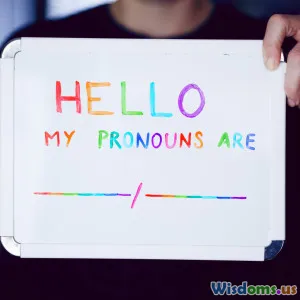
Why Pronouncing Student Names Correctly Changes Lives
13 min read Learn how the correct pronunciation of student names fosters belonging, boosts confidence, and reshapes educational outcomes. (0 Reviews)
Why Pronouncing Student Names Correctly Changes Lives
Introduction: More Than Just a Name
Imagine entering a new classroom. You’re nervous, hopeful, and longing to belong. The teacher calls roll — and stumbles over your name. Maybe they skip it, shorten it, or laugh about how hard it is to pronounce. In that moment, your name — the heart of your identity — suddenly feels like an obstacle.
This isn’t a trivial matter. Across the world, students from countless cultural backgrounds experience the mispronunciation of their names. Sometimes it’s accidental, but the impact is profound, rippling through self-esteem, engagement, and overall well-being.
Research and lived experiences tell a clear story: when educators make the effort to pronounce student names accurately, lives change. Doing so affirms identity, builds trust, creates a more inclusive school environment, and improves academic outcomes. Failure to do so, even when unintended, can reinforce feelings of exclusion and erode students’ sense of self-worth.
Let’s dig deeper, examining evidence, illuminating real stories, and discovering actions we can all take—because embracing every student's name is simple, powerful, and transformative.
The Power and Meaning of Names
Names as Identity: More Than Labels
Anthropologists and sociologists agree: names are meticulously woven into the tapestry of identity. They carry generations of culture, history, and aspiration. As Gloria Ladson-Billings, a renowned education scholar, asserts: “To mispronounce a student’s name is to disregard the very essence of their being.”
Some names recall grandparents and origin stories; others celebrate dreams of parental hopes or resilience passed through centuries. For immigrant and minority children, a name can be their last unapologetic link to their heritage amid assimilation pressures.
Example:
In an NPR segment, Efren Olivares, a Mexican immigrant, described how before coming to the U.S., he loved his unique name. But after years of classmates and teachers using "Eef-run" instead of "Eh-fren," he considered changing it—to fit in. The mispronunciation became a source of embarrassment and invisibility.
Psychological Effects of Mispronunciation
Correct pronunciation fosters belonging. A 2012 study published in the Journal of Experimental Social Psychology found that people whose names are regularly mispronounced can feel “marginalized, disrespected, or seen as outsiders.” These microaggressions accumulate emotionally, making students less likely to participate and more likely to withdraw in group settings.
Conversely, when a student’s name is spoken authentically, it signals respect—affirming their identity and building a bridge of trust. It also validates families, showing the school values students' cultural backgrounds—not just their academic abilities.
The Classroom Ripple Effect
Fostering Inclusivity and Sense of Belonging
The Center for Responsive Schools highlights that getting a child's name right is a “fundamental act of inclusion.” When every student hears their name pronounced accurately, it normalizes multilingualism and diverse cultures across the classroom. It signals that diversity is celebrated, not problematized.
Case Study:
At a public school in California, teachers learned the correct pronunciation of all students’ names, including Vietnamese, Hmong, and Spanish names. The result? The number of students answering the roll call increased dramatically, and surveys showed a notable jump in reported school belonging.
In a world increasingly connected, cultural competence matters. Small gestures, like asking for pronunciation and practicing names, don’t just help one student—they foster empathy and acceptance throughout the class.
Boosting Academic Confidence and Performance
When students feel recognized, they're more apt to raise their hands, seek help, and engage with peers. Studies, such as the one published in Child Development in 2017, reveal that students in inclusive classrooms feel more safe and motivated—directly improving performance.
Researchers have even drawn a link between name recognition and academic mindsets. When a student hears their name pronounced accurately, the fear of being “seen as different” vanishes, replaced by a sense of belonging. The result: greater participation, risk-taking in learning, and resilience in the face of challenges.
Stories That Illustrate the Impact
When a Name Opens Doors
Olumide's Journey: Olumide, a Nigerian-American high school student in Texas, recalls always feeling a microsecond of stress as teachers read the roster. After years of being called "Ollie," a teacher finally asked him, “Can you teach me how to say your name the way your family does?” That year, Olumide flourished. He joined clubs, ran for student council, and ended as valedictorian — crediting the moment he first heard his real name in the classroom as "the start of truly feeling seen and welcomed."
The Cost of Ignorance
Jasmeet Kaur: In fourth grade, Jasmeet pleaded with her mother to let her go by "Jess" at school. Her reason: “No one says Jasmeet. They look at me like I’m weird.” Despite strong grades, Jasmeet felt isolated — until a new teacher read the class roster at year’s end and pronounced ‘Jasmeet Kaur’ with practiced accuracy. Surprised, Jasmeet felt pride: “For the first time, I felt like more than just a student—I belonged.”
Teacher Transformation
Educator Example: Mrs. Kim, a middle-school teacher in Atlanta, led an intentional classroom campaign: every student got to introduce their name, maintain a phonetic card, and quiz their peers (and her) until they all got it right. By semester's end, classroom cohesion soared, discipline issues fell, and students frequently cited name recognition in feedback as a highlight of the year.
Addressing Common Obstacles
“Some Names Are Just Too Hard!”
Let’s be honest—some names require effort, especially when new to a culture or language. But effort itself communicates care. It's all about intent and persistence.
Educators can:
- Ask for the correct pronunciation, and listen carefully.
- Write phonetically in gradebooks or attendance lists.
- Practice discreetly in advance.
- Check in if they're unsure, rather than avoid or shorten the name.
Avoiding Nicknames and Anglicizing Names
Transforming “Zainab” into “Zee” or “Chaitanya” into “Chat” isn’t harmless. These well-intended shortcuts ask students to trade pieces of their identity for others’ convenience. A 2016 Stanford study noted that students called by modified names often reported feelings of “not fitting in.”
By resisting the urge to assign nicknames, educators signal that all names — and by extension, all backgrounds — deserve equal effort and respect.
Mistakes Happen: The Right Way to Recover
Everyone slips up now and then. What separates respectful practice from dismissiveness is how mistakes are handled. Sincerely apologizing, correcting oneself, and persisting until it’s right show humility and care.
“It’s not about never making a mistake, but about making the effort,” notes Dr. Rita Kohli, UC Riverside professor and co-founder of Teachers of Color Network. “That effort demonstrates respect, and students notice.”
Evidence and Research-Based Findings
-
Name Ethnicity Effect: A 2011 University of Melbourne study found that teachers, on average, gave lower academic and behavioral ratings to students with names they couldn’t pronounce, establishing a hidden bias impacting educational opportunities.
-
Student Outcomes: Harvard’s Making Caring Common Project reported that students whose teachers used their correct names reported feeling twice as likely to “enjoy coming to school.”
-
Long-Term Impact: Research from the USA’s National Education Association underlines that microaggressions like misnaming, even when subtle, can accumulate, contributing to negative student outcomes, lower graduation rates, and less positive school experience.
-
Anecdotal Evidence: In thousands of interviews, youth voices echo one consensus—having your name pronounced correctly is a foundational sign of being valued.
Actionable Strategies for Every Classroom
1. Start Day One With Intention
Begin the school year by inviting students to introduce themselves, modeling careful listening.
- Use name tents or desk signs with phonetic writing.
- Encourage students to record audio clips explaining and pronouncing their names, using classroom apps or platforms like Flipgrid.
2. Leverage Technology
Many online platforms, like ClassDojo, have built-in features for audio name pronunciation. Others, like NameCoach, let teachers pre-listen to student pronunciations before class.
3. Check In Periodically
Circumstances change. Teachers should check in mid-year, especially if there's a substitute, or when new students arrive.
4. Facilitate Peer Learning
Incorporate lessons on cultural diversity, inviting students to share the meanings or stories behind their names (as comfortable). This deepens understanding and builds community.
5. Institutionalize Professional Development
Administrators should offer staff workshops on cultural competence, including exercises to practice unfamiliar names and understand their significance.
Beyond the Classroom: A Ripple Across Communities
Maintaining name dignity doesn’t stop at the classroom door. When schools model respect for names, students advocate for themselves outside school, in workplaces, and public spaces. Teachers who prioritize name accuracy often find parents become more engaged, knowing their culture and language are valued partners in education.
Inclusive name pronunciation also signals ethical leadership for communities—setting a tone that reduces bullying, microaggressions, and bias, from playgrounds to boardrooms.
“When educators value students' names, they teach all children to respect differences and honor origins,” says Dr. Clifford Lee, education equity researcher.
Conclusion: A Simple Act, A Profound Outcome
Changing a life doesn’t always require grand gestures. Sometimes, it looks as simple as pronouncing a name correctly.
This act affirms dignity, nurtures self-worth, and weaves connection in a diverse, changing world. It champions equity—embracing every student as their fullest self, not as a problem to be solved or a tongue twister to avoid.
For educators, school leaders, students, and anyone invested in the power of education, it’s time to commit: Learn the names. Say them right. Change lives, one word at a time.
Further Reading & Resources:
- National Education Association: “My Name, My Identity” Campaign
- NameCoach: Name pronunciation resources
- Stanford Graduate School of Education: Cultural Humility and Classroom Practices
Rate the Post
User Reviews
Other posts in Social Psychology
Popular Posts


















